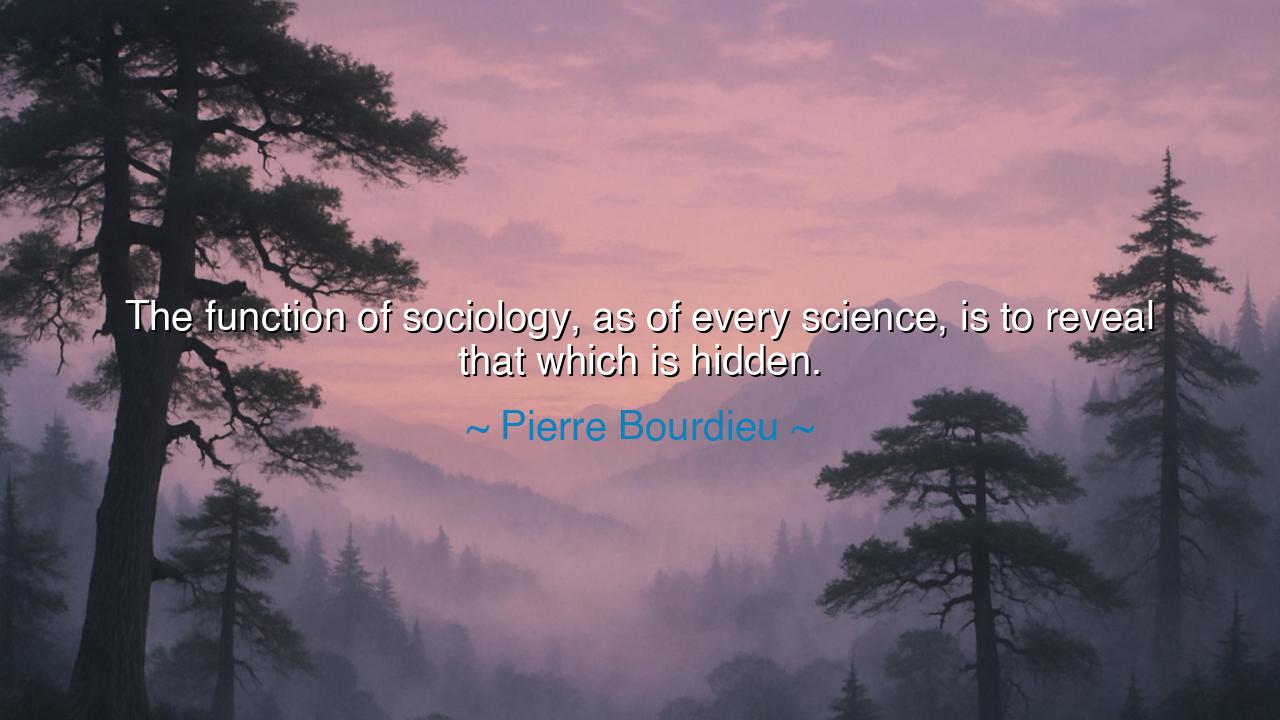
The function of sociology, as of every science, is to reveal that






"The function of sociology, as of every science, is to reveal that which is hidden." These words from Pierre Bourdieu carry with them a deep truth about the role of science and sociology in our lives. Bourdieu calls us to recognize that the true function of sociology—and, indeed, any field of knowledge—is to uncover the hidden truths that lie beneath the surface of our everyday existence. We live in a world where many of the forces that shape our lives—our social structures, cultural norms, and power dynamics—remain concealed from our view, often operating in ways so ingrained that we fail to see them for what they are. Sociology, as Bourdieu suggests, exists to pierce the veil of ignorance and reveal the systems of influence that dictate how we think, act, and relate to one another.
In the ancient world, philosophers like Plato sought to uncover the hidden realities of the world by asking profound questions about the nature of justice, knowledge, and reality. In his Allegory of the Cave, Plato illustrated the struggle of the human mind to escape from the shadows of ignorance and see the light of truth. The prisoners in the cave are like those who live their lives in the darkness of societal structures, unaware of the forces shaping their existence. It is only when they break free from the chains of conventional wisdom and explore the depths of reality that they can see the world as it truly is. This ancient teaching mirrors Bourdieu’s understanding of sociology as a discipline of revelation, one that uncovers the forces that have been hidden from our view for so long.
Consider the work of Karl Marx, whose study of society revealed the hidden dynamics of class, power, and wealth. Marx, through his critical theory, peeled back the layers of capitalism to expose how it perpetuates inequality, oppression, and exploitation. Marx’s exploration of economic systems was not merely an academic exercise but a revelation—one that changed the way we understand the relationship between labor and capital. Marx’s work revealed the invisible hand that controlled society’s structures and pointed out the flaws that perpetuate social injustice. In much the same way, Bourdieu believed that sociology had the power to reveal those forces that remain hidden, allowing us to see society with clearer eyes and make informed choices.
In the modern world, Bourdieu himself dedicated much of his life to revealing the hidden systems of power and inequality that shape our world. Through his concept of cultural capital, Bourdieu showed how power is often transferred not through direct economic means, but through more subtle forms of social capital—the privileges that come with education, family background, and social connections. This concept of cultural capital revealed how societal structures are not only maintained through economic systems but also through the invisible systems of culture and social status. It is this kind of revelation that sociology strives to achieve—bringing to light those forces that shape our lives, often without our realizing it.
This call for revelation is not simply academic—it is an act of empowerment. In revealing that which is hidden, sociology offers us the tools to understand and challenge the systems that govern our lives. Consider the civil rights movement in the United States, which was born from a recognition of the hidden injustices that permeated society. Martin Luther King Jr. and others in the movement sought not just equality but a revelation of the systemic racism that was embedded in the laws, institutions, and social norms of the time. By unveiling these hidden truths, they empowered a generation to act, to dismantle the systems of oppression that had been accepted as normal. Through sociological revelation, they sought not just knowledge but action—to bring about change in society.
Bourdieu’s insight encourages us to seek deeper understanding in our own lives. In our daily routines, we are often unaware of the social forces that shape us. We may not realize how much our education, social class, or cultural norms influence our thoughts, behaviors, and beliefs. But when we begin to peel back the layers of these hidden forces, we begin to see the truth more clearly. The lesson here is that knowledge is not just about accumulating facts—it is about revealing the unseen and understanding how those hidden systems impact us. As we uncover these truths, we gain the power to change not just our own lives but the lives of others, challenging the systems that bind us and seeking to create a more just world.
In our own lives, let us follow Bourdieu’s call to seek revelation. Whether through the study of sociology, history, or philosophy, we must actively look for those forces that govern our world but remain hidden from view. We must question the status quo, seek to understand the invisible systems of power, and use that understanding to build a society that is more equitable and just. Just as the great philosophers and sociologists of the past revealed hidden truths, so too must we use the knowledge we uncover to empower ourselves and others, and to create a world where truth and justice are not hidden but known to all.






AAdministratorAdministrator
Welcome, honored guests. Please leave a comment, we will respond soon